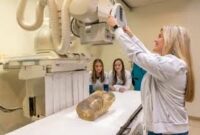In the ever-evolving field of healthcare, radiologic technology has emerged as a significant area of specialization, particularly X-ray technology. As medical facilities continue to rely on advanced imaging techniques to diagnose and treat patients, the demand for qualified X-ray technicians is on the rise. If you’re considering a career in this rewarding field, you may be searching for “X-ray tech programs near me.” This comprehensive guide will provide you with in-depth information about X-ray tech programs, what to expect from them, and how to choose the right one for your career aspirations.
1. Understanding the Role of an X-Ray Technician
What Does an X-Ray Technician Do?
An X-ray technician, also known as a radiologic technologist, is responsible for performing diagnostic imaging examinations using X-ray equipment. Their primary duties include:
- Patient Preparation: Ensuring patients are comfortable and informed about the procedure, as well as positioning them correctly to capture the best images.
- Equipment Operation: Operating X-ray machines and ensuring they are functioning properly.
- Image Quality Assurance: Reviewing images for clarity and accuracy and making adjustments as needed.
- Safety Protocols: Adhering to safety standards to minimize exposure to radiation for both patients and staff.
- Collaboration: Working closely with radiologists and other healthcare professionals to provide quality patient care.
Importance of X-Ray Technicians in Healthcare
X-ray technicians play a crucial role in the healthcare system by facilitating accurate diagnoses. According to the American Society of Radiologic Technologists (ASRT), radiologic technologists are essential for the effective functioning of healthcare facilities, as they provide the imaging necessary for physicians to make informed decisions about patient treatment.
2. Benefits of Pursuing an X-Ray Tech Program
Career Opportunities
Graduating from an X-ray tech program opens doors to various job opportunities. X-ray technicians can work in:
- Hospitals
- Outpatient clinics
- Diagnostic imaging centers
- Mobile imaging companies
- Research facilities
Competitive Salary
According to the U.S. Bureau of Labor Statistics (BLS), the median annual wage for radiologic technologists was around $61,900 in 2023. This figure can vary based on location, experience, and specialization, making it a lucrative career choice.
Job Security
The demand for radiologic technologists is projected to grow by 7% from 2022 to 2032, faster than the average for all occupations. This growth is driven by an aging population and advancements in medical imaging technology.
Flexibility and Specialization
X-ray technicians have various pathways for specialization, such as MRI, CT scans, or mammography. This flexibility allows individuals to tailor their careers to their interests and strengths.
3. Types of X-Ray Tech Programs
Certificate Programs
Certificate programs are typically shorter, lasting from several months to a year. They focus on the essential skills needed to start a career in radiologic technology. These programs may be ideal for those looking to enter the workforce quickly.
Associate Degree Programs
An Associate Degree in Radiologic Technology is the most common pathway to becoming an X-ray technician. These programs usually last two years and include both classroom instruction and clinical practice. They cover topics such as anatomy, patient care, radiation safety, and imaging techniques.
Bachelor’s Degree Programs
For those seeking advanced career opportunities, a Bachelor’s degree in Radiologic Technology may be the best fit. These programs typically span four years and include a more comprehensive curriculum, covering advanced imaging techniques, healthcare management, and leadership skills.
Online Programs
With the rise of online education, several institutions now offer online X-ray tech programs. While the theoretical portion can be completed remotely, students must still fulfill clinical hours in person at approved healthcare facilities.
4. Factors to Consider When Choosing an X-Ray Tech Program
Accreditation
Ensure that the program you choose is accredited by recognized organizations, such as the Joint Review Committee on Education in Radiologic Technology (JRCERT). Accreditation indicates that the program meets high educational standards.
Clinical Experience
Look for programs that offer robust clinical training opportunities. Hands-on experience is crucial for developing the skills necessary to succeed as an X-ray technician.
Location
Consider programs that are conveniently located near you. Proximity can save time and reduce travel costs, making it easier to attend classes and clinical rotations.
Financial Aid and Tuition Costs
Investigate the tuition costs of various programs and explore financial aid options. Many schools offer scholarships, grants, and payment plans to help students manage educational expenses.
Program Reputation
Research the reputation of the program and read reviews from former students. A strong track record of job placement and positive feedback can be indicators of a quality program.
5. The Application Process
Prerequisites
Before applying, ensure you meet the program’s prerequisites, which may include high school diplomas or equivalent, minimum GPA requirements, and relevant coursework in science and math.
Application Materials
Typically, you will need to submit the following materials during the application process:
- Application form
- Transcripts from previous education
- Letters of recommendation
- Personal statement or essay
- Standardized test scores (if applicable)
Interview Process
Some programs may require an interview as part of the selection process. Prepare to discuss your interest in the field, relevant experiences, and career goals.
6. What to Expect in an X-Ray Tech Program
Curriculum Overview
Most X-ray tech programs include a mix of classroom instruction and hands-on training. Core subjects often covered include:
- Radiographic procedures
- Radiation physics
- Anatomy and physiology
- Patient care and management
- Medical ethics and law
Clinical Rotations
Clinical rotations are a vital part of the training process, allowing students to apply their knowledge in real-world settings. Students will gain experience in patient interaction, equipment operation, and image evaluation.
Certification Preparation
Many programs prepare students for certification exams, such as the American Registry of Radiologic Technologists (ARRT) exam. Passing this exam is essential for obtaining licensure and practicing as an X-ray technician.
7. Job Outlook and Salary Expectations
Employment Projections
As previously mentioned, the job outlook for X-ray technicians is promising. Factors contributing to this growth include an aging population requiring more diagnostic imaging and technological advancements in the field.
Salary Insights
While the median salary is around $61,900, those with specialized skills or advanced degrees can earn significantly more. For instance, MRI technologists can earn upwards of $75,000 per year.
8. Continuing Education and Career Advancement
Importance of Continuing Education
As technology and practices evolve, continuing education is essential for X-ray technicians to maintain their certification and stay current in the field. Many states require continuing education credits for license renewal.
Advancement Opportunities
Radiologic technologists can advance their careers by pursuing additional certifications or specializations. Opportunities for advancement include roles such as:
- Radiology Manager
- Educator or Trainer
- Advanced Practice Radiologic Technologist (APRT)
9. Conclusion
Pursuing a career as an X-ray technician is a rewarding path that offers numerous opportunities for growth and advancement. By researching “X-ray tech programs near me,” you can find the right educational path to kickstart your career in this vital healthcare field. Whether you choose a certificate program, an associate degree, or a bachelor’s degree, you’ll be taking the first step toward a fulfilling and in-demand profession.
Call to Action
If you’re ready to embark on your journey toward becoming an X-ray technician, start by researching accredited programs in your area. Consider reaching out to admissions counselors to learn more about the application process, financial aid options, and what to expect in your studies. Your future in radiologic technology is bright—take the leap today!



